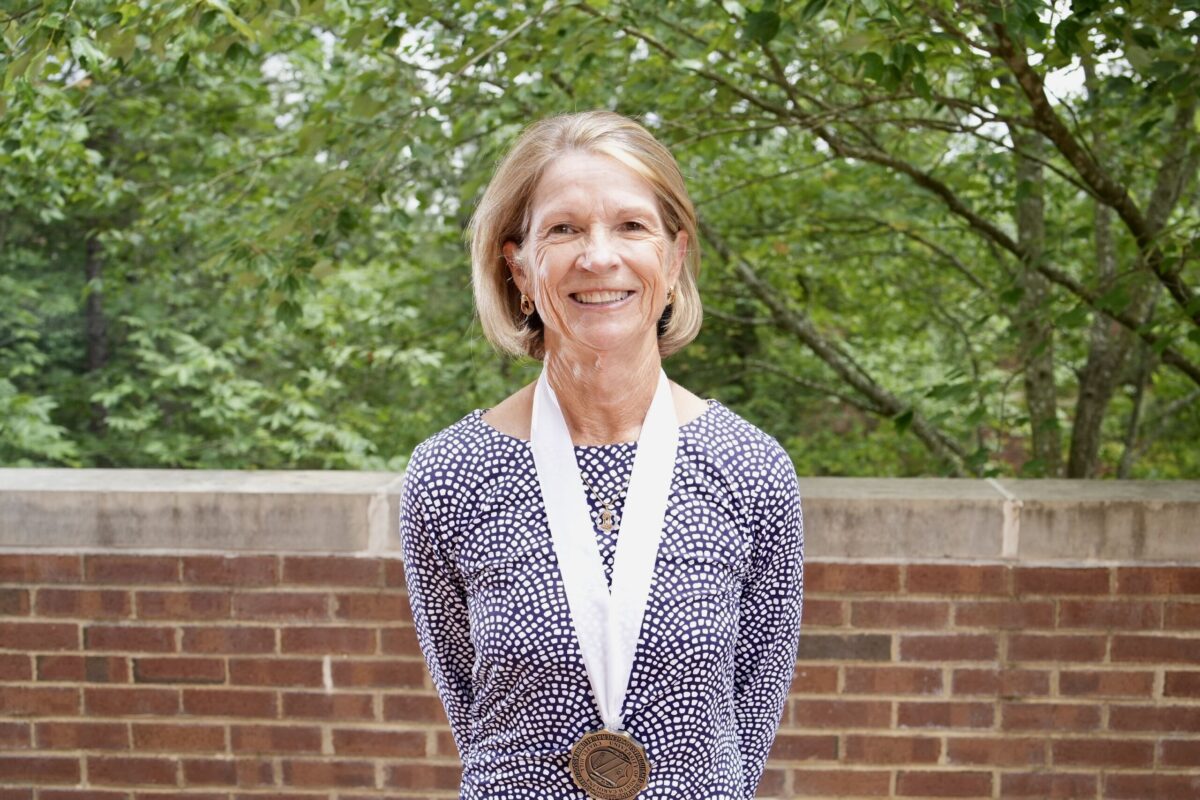Karen C. Shelton, Distinguished Service Medal Citation
Posted on May 13, 2023(Editor’s Note: The GAA’s Distinguished Service Medal citations, such as this one, are read to the audience at the Annual Alumni Luncheon and then presented as a keepsake to the recipients.)

Karen C. Shelton. Photo: Ray Black III
Karen Shelton channeled her fiercely competitive nature onto the field during her 42 years as head coach of UNC’s field hockey team. Recently retired, Shelton — the winningest coach in the sport’s history, with a career record of 745 wins, 172 losses and nine ties — now directs her competitive spirit to killer workouts at the training facility Orangetheory Fitness and cut-throat games of pickleball.
The only time her take-no-prisoners facade melts is when her grandchildren rush onto the field after a game, and “Coach” becomes “Coco.” Shelton has been known to delay post-game press conferences until she’s had sufficient time to hug her grandkids.
Carolina recruited Shelton as head coach when she was only 23. She’d grown up with her seven siblings in a close-knit family that moved often to follow her father’s Army career. She tried out for field hockey in high school, the only women’s sport at the time, and found she was good at it. In 1975, she went to West Chester State College in Pennsylvania with the aim of becoming a physical education teacher. The school had an accomplished field hockey team, and Shelton played on three of its four national championship teams and was named National Player of the Year three times.
In her junior year, Shelton made Team USA, the U.S. national team for women’s field hockey, which put her on the radar of Dolly Hunter, UNC’s field hockey coach at the time. When Hunter called a few years later, Shelton demurred. She didn’t want to be a head coach because she intended to continue playing for Team USA, which had to stay home from the Olympics in Moscow in 1980 due to the U.S. boycott of the games. She was determined to play in 1984. (She did, and the team brought home a bronze, its first international prize.)
But when she visited Carolina in 1981, she fell in love with the program and the University and, later, with the head coach of the men’s lacrosse team, Willie Scroggs, whom she married. She became brand-new athletic director John Swofford’s first hire.
Every year, Shelton and her Tar Heels got better. She felt she had the best job in the country and never looked elsewhere. The wins added up; so did the tournament titles and the coaching awards. Her Tar Heel teams have won a record 10 national championships, made more tournament appearances (39) than any other team, notched more victories (77) and played the most tournament games (106). She was named ACC Coach of the Year a dozen times, National Coach of the Year five times and was part of the group that received National Staff of the Year four times. She is a member of the National Field Hockey Coaches Association Hall of Fame and the USA Field Hockey Hall of Fame. In 2018, UNC’s new field hockey stadium was named in her honor.
Pressure to perform increased with the accolades. The more her teams won, the more fans expected them to win. For 10 years in a row, her teams made the Final Four but didn’t bring home the title, and fans asked, “Why can’t they win the Big One?” If the team didn’t make the Final Four, fans would write it off as a bad season. Every competitor brought their A game to Chapel Hill because of the program’s reputation. All of that pressure landed on Shelton. To put it in perspective, a colleague said, “She’s coaching a team in an undefeated season in a stadium with her name on it.” And yet she persevered.
Fans’ expectations paled in comparison to those she heaped on herself. She constantly sought ways to improve and innovate. While other coaches scouted overseas for players, she looked there for coaching staff who would bring new ideas and insights. She hired for her blind spots. She partnered with a sports psychologist before other sports saw the advantages. She came up with new plays and new team rules. When recruiting players, she thought a decade out. She brought out the best in her players on the field and motivated them to be “beautiful, strong, independent women,” as she always told her players.
As she evolved, so did the sport. When Shelton began coaching, women’s sports were part of the Association for Intercollegiate Athletics for Women. The NCAA was exclusively for men. For 13 years, her teams practiced only at night because the football team had the field from 4 to 6 p.m., followed by the band until 7:30. For away games, women were housed four to a room, two per bed. Men’s teams gave each player his own bed. Budgets were small for women’s teams, so Shelton and an assistant coach would each drive a van, for instance, 12 hours to Connecticut and 12 hours back home. Once the NCAA allowed women, conditions changed for the better.
Shelton retired at the top, after yet another undefeated season. “I miss coaching already,” she said, “but I’m sleeping better.”
The Distinguished Service Medal is presented by the GAA Board of Directors.
